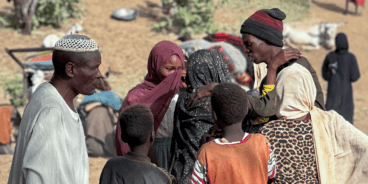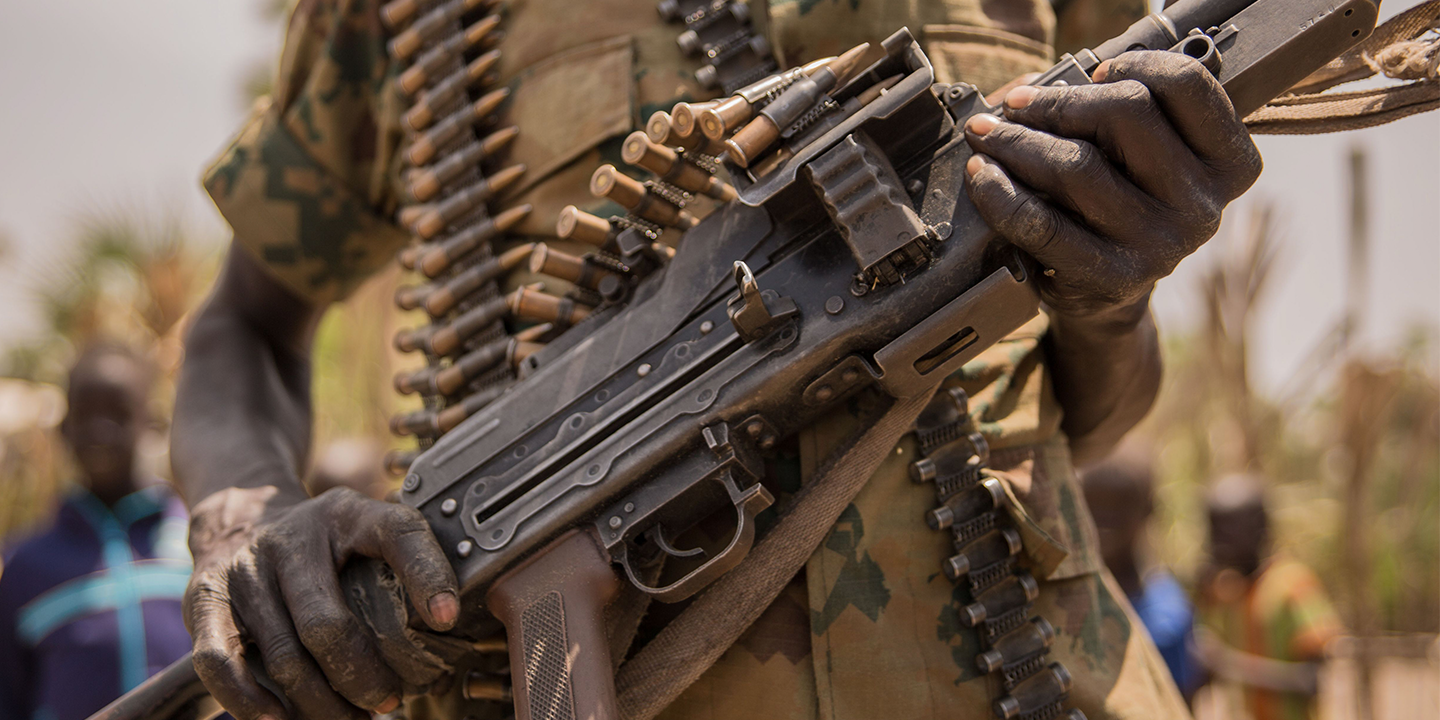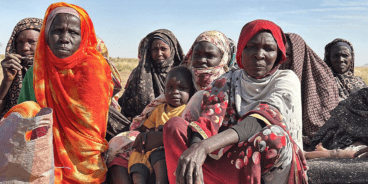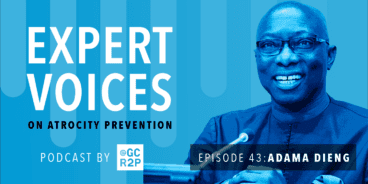

Atrocity Alert No. 304: Sudan, El Salvador and Israel and the Occupied Palestinian Territory
Atrocity Alert is a weekly publication by the Global Centre for the Responsibility to Protect highlighting situations where populations are at risk of, or are enduring, mass atrocity crimes.
INTER-COMMUNAL VIOLENCE SPIKES IN DARFUR AMIDST CONTINUED TENSIONS IN KHARTOUM
Following a dispute over land ownership on 6 June, clashes erupted in Sudan between the Gimir and Rezeigat communities in Um Hereez village, Kulbus locality of West Darfur. In the subsequent days clashes spread to the Kreinik, Jebel Moon and Sirba localities. Between 6-11 June at least 125 people were killed and 50,000 displaced as a result of fighting while 25 Gimir villages were fully or partially burned and looted.
Civilians in Darfur have been at increased risk of violence and atrocities since the October 2021 military coup. State presence is insufficient in the Darfur region, as armed forces have been re-deployed to Khartoum to address ongoing political instability, leaving communities vulnerable to attacks. Between 25 October 2021 and 10 April 2022, the UN’s joint human rights office in Sudan documented 40 incidents of inter-communal violence in Darfur that resulted in the death of 450 people. On 24 April at least 168 people were killed when Janjaweed fighters attacked non-Arab Massalit villages around Kreinik, West Darfur.
Meanwhile, the political situation across Sudan remains tense as mass demonstrations against the coup continue to take place. The Office of the UN High Commissioner for Human Rights (OHCHR) confirmed that security forces have repeatedly used excessive force against peaceful protesters, including the use of lethal weapons such as AK-47 assault rifles and machine guns. At least 100 civilians have been killed during protests since October and OHCHR has also received numerous reports of sexual and gender-based violence against women and girls, including rape, gang rape and other forms of sexual violence.
Earlier this month the UN Expert on Human Rights in Sudan, Adama Dieng, visited the country. In a statement on 4 June he emphasized that, “there can be no justification for firing live ammunition at unarmed protestors.” Although the state of emergency was lifted on 29 May and detainees have been released, Dieng also stressed that, “more bold and concrete actions are needed to improve the human rights situation and build confidence.”
Sudanese authorities must expeditiously implement the security arrangements included in the Juba Peace Agreement and deploy more joint security forces to hotspot areas in Darfur to protect vulnerable populations. The Sudanese security forces must end the use of excessive force against protesters and investigate all human rights violations. During the current session of the UN Human Rights Council, member states must support the adoption of a resolution that ensures continued attention to Sudan’s human rights situation through formal public debates.
RISING RISKS AS AUTHORITIES IN EL SALVADOR COMMIT MASSIVE HUMAN RIGHTS VIOLATIONS
Since the imposition of a state of emergency in El Salvador on 27 March, government authorities have been accused of widespread human rights violations, including arbitrary detentions, torture and ill-treatment, possible short-term enforced disappearances and violation of due process rights. On 13 June the UN High Commissioner for Human Rights, Michelle Bachelet, cited reports that more than 38,000 people have been arrested in the past three months while at least 21 people have died in state custody.
The country’s Legislative Assembly initially imposed the state of emergency in response to alleged gang violence that killed at least 62 people on 26 March. Since then, mass arrests have targeted marginalized and low-income neighborhoods without any evidence that the individuals arrested were involved in gang activity. According to Amnesty International’s Americas Director, Erika Guevara-Rosas, the large-scale arrests are being carried out at an unprecedented speed while journalists and human rights defenders speaking out on the crisis – including on secret deals between the government and violent gangs – have faced harassment and criminalization.
El Salvador has experienced a human rights and security crisis for decades. In the context of fighting violent crime, security forces have been accused of extrajudicial executions, sexual violence and torture. According to Human Rights Watch, gangs and police were involved in some of the 13,000 disappearances recorded between 2014-2020. Impunity for past and ongoing violations remains, including for atrocities committed during the country’s 12-year civil war that ended in 1992. Since President Nayib Bukele took office in June 2019, he has taken severe steps to undermine human rights protections and the country’s institutions, including severely curtailing judicial independence and, in one instance, deploying heavily armed soldiers to the Legislative Assembly to force legislators to approve a draft bill.
In order to prevent an escalation to atrocities, El Salvador needs a long-term strategy to address gang violence and ensure justice for victims, in line with the its obligations under international human rights law. The international community must exert maximum scrutiny on authorities in El Salvador regarding the erosion of the rule of law, growing authoritarianism and possible crimes under international law. Elisabeth Pramendorfer, Senior Human Rights Officer at the Global Centre for the Responsibility to Protect, warned that, “while President Bukele utilizes repressive state policies and egregious violations to allegedly curtail gang violence, he is driving the country into an unprecedented crisis that leaves citizens at heightened risk of abuse by state agents.” President Bukele’s increasing grip on power, the pervasive culture of impunity and the prolonged state of emergency are a disastrous combination with the potential to further deteriorate the human rights situation in the country.
UN-MANDATED INQUIRY FINDS ISRAEL’S OCCUPATION OF PALESTINE FUELS RECURRENT CONFLICT
On 7 June the UN Human Rights Council (HRC)-mandated Independent International Commission of Inquiry (CoI) on the Occupied Palestinian Territory (OPT), including East Jerusalem, and Israel, released its first report, finding that the root causes of recurrent tensions and protracted conflict in the region are due to Israel’s “perpetual occupation” of Palestinian territory.
Commissioner Chris Sidoti stated that, “Israel clearly has no intention of ending the occupation. In fact, it has established clear policies to ensure complete permanent control over the Occupied Palestinian Territory. This includes altering the demography of these territories through the maintenance of a repressive environment for Palestinians and a favourable environment for Israeli settlers.” The UN Special Rapporteur on the situation of human rights in the OPT previously determined that Israel’s 55-year occupation amounts to a war crime, and that Israel’s political system of entrenched rule satisfies the prevailing evidentiary standard for the existence of the crime of apartheid.
The CoI identified a range of factors contributing to recurring cycles of violence, including forced evictions and displacement of Palestinians, the transfer of the civilian population through illegal Israeli settlement construction and expansion, Israeli settler violence targeting Palestinians, and the 15-year blockade of Gaza. “Persistent discrimination” against Palestinians “lies at the heart of the systematic recurrence of violations” in the region.
The CoI also found that impunity for Israel’s violations and abuses of international law are fueling increased resentment among Palestinians. According to the CoI, the Palestinian Authority often uses Israel’s occupation as a justification for its own human rights violations while the de facto authorities in Gaza have shown little adherence to International Humanitarian Law or a commitment to upholding human rights.
Following deadly violence in Israel and the OPT during April and May 2021, the HRC held a special session and established the CoI. Chaired by former UN High Commissioner for Human Rights, Navi Pillay, the CoI has an unprecedented open-ended mandate to investigate violations of international law and identify the root causes of recurrent tensions, instability and protraction of conflict in the OPT and Israel.
The CoI emphasized that ending Israel’s occupation – in line with various UN Security Council resolutions – is essential to halt the persistent cycle of violence in Israel and the OPT, as well as “to reverse historical injustices and move towards self-determination of the Palestinian peoples.” The international community, including all UN member states, must actively support the work of the CoI and ensure that all of its recommendations are implemented.
Related Content


Joint Statement: Genocide Returns to Darfur
